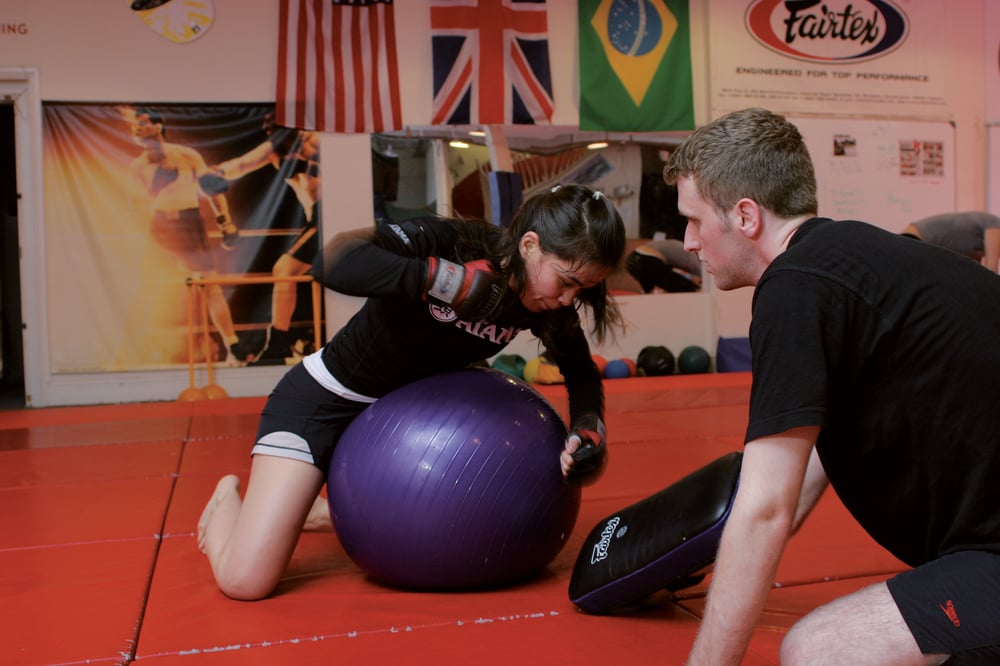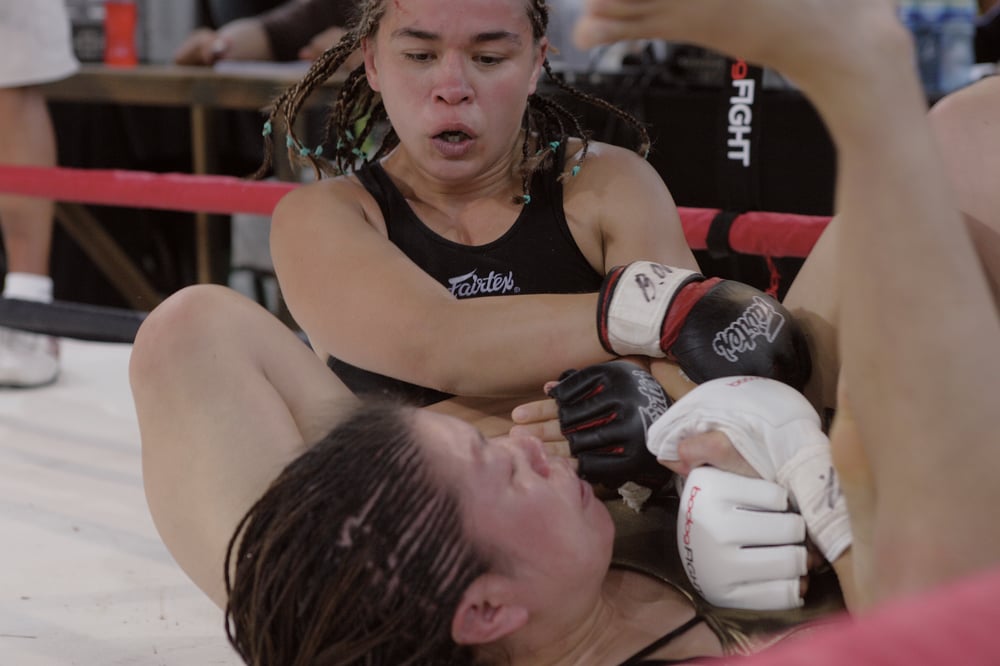
Issue 028
August 2007
“I remember the first time that I really hit somebody with intent. Part of me was saying ‘I shouldn’t be doing this’ and another part of me really liked it.”
The dichotomy presented in that sentence fairly accurately sums up the fighter in this article, the same one who came out with it. Rosi Sexton is pretty much everything that your average person in the street wouldn’t expect a ‘cage fighter’ to be.
The 30-year-old, PhD-qualified Cambridge University graduate, part-time student (of Osteopathy), full time mother, is a one-woman stereotype buster. Articulate and modest, she has a cerebral attitude to the fight game and in this article she gives us an insight into her hopes and aspirations.
Like a lot of pro fighters, Rosi started in traditional martial arts as a teenager but with time decided that she wanted more. She started fighting mixed martial arts (MMA) in 2002, and five years on and eight fights (with one loss) later, she hasn’t looked back. In the midst of her career she also took time out for the birth of her two-year-old son Luis, who has been integrated into Sexton’s busy life as she tries to maintain a balance between all of her priorities.
“It can be like trying to balance a pencil on it’s point. If I’ve got a fight coming up I’ll be focussing a lot more on that. If I’ve got exams coming up then I have to put a bit more time into that. In between all of this I’m trying to get time to spend with Luis. Fortunately I’ve got a great support network, which helps”.
With female MMA being a minority within the growing sport of MMA, Rosi always had a struggle to find opponents. Sexton’s signing to the promotion BodogFIGHT has meant her career has started to really take off. “There’s only so many people you can fight in the UK and you can only get to a certain level fighting domestically. To make the jump from there to fighting internationally you’ve either got to find somebody who’s willing to fly international opponents in or somebody who’s prepared to fly you out, and that’s not always easy. Until Bodog came along getting some of the smaller promotions in the US to fly someone over from the UK was very hard. They’re not struggling so much for opponents as I am.
“When Bodog came along they picked up a lot of the female fighters from around the world and since that’s taken off I can count on getting fights a few times a year. I’m getting to fight some of these international opponents and some of the big names that are out there”.
Bodog’s willingness to use female fighters and the regularity of it’s events bring stability to Sexton’s career, but also guarantees her an income. “With Bodog coming in they pay better than anyone else for female fighters, and it’s got to the stage where that’s the biggest part of my income. I’ve just got a sponsorship deal with PhD Nutrition which is helping me out with that side of things. I like their attitude because unlike a lot of companies out there they’re targeted towards athletes, not just body builders, and understand what athletes need. I actually do like their stuff too, which helps!”
In her first fight with BodogFIGHT she managed to beat the Brazilian jiu-jitsu (BJJ) black belt Carina Damm with an arm bar late in the first round, surprising many observers.
“I think that I was underestimated going in… I suspect that I was brought in to lose. There was a lot of game plan went into that… I knew my conditioning was going to be better than hers, we worked really hard for that fight. The plan was to work a tight clinch game, a bit of hitting in the clinch. I knew she was really strong as soon as I got hold of her but I knew that she wasn’t going to be able to keep that pace up for three rounds and there was going to come a point where she was gonna gas. Eventually she got the take down but didn’t have enough left to do anything with it. I played that game as it needed to be played”.
The second fight, against Windy Tomoni, was a little more controversial and ended with the Japanese fighter suffering a broken leg as Sexton threw her to the canvas. The fight went to the judges cards instead of being classed as a straight TKO injury win, which raised a few eyebrows. “That was a bit strange. To be honest it didn’t seem right to make a fuss about it under the circumstances. I would think that had she broken my leg with a leg kick at that point she should’ve won despite the fact that I dominated the first round. I don’t really see the difference between breaking someone’s leg with a leg kick and breaking it with a legal takedown. Obviously it was an accident, but I’ve had people suggest that it was intentional. If I could do that intentionally I’d be a lot better than I am”.
Fighters and people who have witnessed Rosi in training have often commented on her sometimes unusual training routines, techniques and work ethic. But with Rosi it’s very much a case of necessity being the mother of invention. “I can’t afford to have any dead training time when I’ve got so many things going on. It’s about training smart as much as anything else. A lot of the training techniques and stuff comes from Karl (Tanswell, her coach). He’s very analytical but he’s also very creative with it. He’ll look at what needs to be done and then come up with a drill that’ll develop the right skills or the right conditioning or work out. It’s all very specific to what I need to do”.
“If something’s going wrong it isn’t just a matter of ‘I’m not very good at that’, it’s more ‘Why isn’t it working? What’s going wrong there? What do we need to improve and how can we do that?’ To be honest, I think that a lot of the reason I’m where I am is because of the way that I train”.
Rosi is frightening intelligent and has a very agile mind, so why would she choose fighting? Why would someone with so much brains pick a career of brawn? “I do it because on one level it’s a huge challenge and it’s such a technical sport. It’s probably the most technical sport in the world in terms of [what] you have to know, tactics, putting it all together. It just goes so deep and I find that fascinating. You’ve got stand-up, clinch, ground, and you’ve got so many ways of mixing those things together. Each one of those things on its own is a life’s study. People spend their lives doing boxing, jiu jitsu, wrestling: you can go into it as deeply as you want and there’s still more to find. On top of that you’ve got all the sports science, the conditioning, the sports psychology, you’ve got the whole emotional aspect of fighting. It’s just a massive study, it’s a science and I’m fascinated by it.
“I don’t think being intelligent and being a fighter should be contradictory. I think to be a good fighter you need to be intelligent to understand all of that and put it together. The best fighters tend to be smart fighters. There may be a perceived dichotomy there but in reality I don’t think that there is”.
“Another reason I do it is because on some level I’m fascinated by violence. I think a lot of people are but most of them don’t want to admit it. It’s such a big taboo in our society. Take the car crash scenario, where people slow down to look at a car crash. On some level people are drawn to it and fascinated by it. It’s part of the way we’re built, we evolved to be able to deal with inter personal violence – intermale violence in particular is something which evolutionarily has a long history. To take that out of society completely is to ignore the fact that it’s part of us. MMA is a safe and non-exploitative way to explore that and to find out about that part of me”.
“I remember the first time that I really hit somebody with intent. Part of me was saying ‘I shouldn’t be doing this’ and another part of me really liked it.
The conflict between those two sides of me. There’s also the aspect of how I respond when somebody really hits me, how do I feel about that and going into a fight knowing that the other person’s going to be trying to knock me out. There’s so much of me that I would never have got to see if I hadn’t done this. Not all of it’s pretty, I don’t like all of it but I’d rather know who I am to start with and then channel that in an appropriate way”.
As much as she may find out about herself in the ring, there are other factors at play in driving her on, and that is to be the best that she can. “I want to be the best in the world at 125 lbs, that’s my goal at the moment and I’m hoping to get there in the next few years. There, I said it! I’ve just got to go do it now!”
THE ART OF JUGGLING RESPONSIBILITIES
Rosi has to blance her life as a mother, a fighter and a student. Here she describes a typical day:
“We’ll get up whenever he [Luis, her son] wakes up, which is usually about 8am these days. I get a few hours with him in the morning before I drop him off with the child minder.
“I’ll then go training; either a conditioning session, a technique session or sparring – whatever I’ve got planned for that day. I’ll come home and have a couple of hours in the afternoon where I’ll try and get some uni work done and whatever else I need to do.
“Then I go back and train again before picking Luis up on the way home and that’s an average day. On top of that you have cooking and stuff like that.
“I’ve got to pay attention to my nutrition and my diet so I make it a priority. Then I’ve got sports psychology exercises to do which can take another half an hour a day. Then I’ve got all the work I do to recover from training and basically keep myself in one piece from one week to the next. It’s a pretty full life, I don’t have much time to get bored.”












